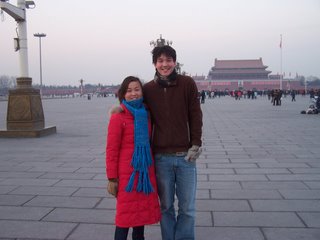 It wasn't a long walk to Tianamen square, but there were a tons of things to see. On the way, I ran into Oriental Plaza, which is a street that has a lot of stores. On a Sunday afternoon, it was so crowded that it was difficult to navigate the crowd and all of the stores were packed with shoppers. It was worse than most American malls during Christmas shopping season. I marveled at the consumerism for a while before going back to the road that would eventually lead me to Tianamen square and things to touch.
It wasn't a long walk to Tianamen square, but there were a tons of things to see. On the way, I ran into Oriental Plaza, which is a street that has a lot of stores. On a Sunday afternoon, it was so crowded that it was difficult to navigate the crowd and all of the stores were packed with shoppers. It was worse than most American malls during Christmas shopping season. I marveled at the consumerism for a while before going back to the road that would eventually lead me to Tianamen square and things to touch.On the way to Tianamen square, two girls stopped me and started talking with me. They said they wanted to practice their American slang and kept saying "sick" and "sweet" with Chinese accents. We talked in English because it was clear that my Chinese was not up to par and they really wanted to try out their slang. American Slang is very popular in China and one of my escorts, "Lilly" has bought eight books on it and a few DVD's.
As we went through Tianamen square, we talked about American Pie, which is HUGE in China. Usually, when young Chinese meet Americans, American Pie is discussed. I suspect that the Chinese government allowed for that movie to pass through because it was such an awful depiction of American students. At the end of high school, every Chinese student is studying for a do-or-die exam that will determine the course of the rest of their life. In contrast, the Chinese think that American students are ending their education with whatever is depicted in American Pie, Chinese interpretations of the movie vary, but they all reflect poorly on the work ethic of real American students. Lilly asked me if there really was a party after graduation where everyone lost their virginity. If you were to briefly reflect on the movie, it is not difficult to determine how she drew these conclusions. From there, it really isn't a far jump to think that this party was not only condoned, but also sponsored by the school, as the kids all targeted Prom. Whatever be the collective Chinese interpretation of American Pie, it surely doesn't lead them to believe that America is earning its future. People here work all the time (Cab drivers work all but two days a month) and likely have no idea that their economy is being artificially depressed by the government.
Information is communicated in one way that I had not anticipated. Newspapers are posted around the city. Papers are affixed on little kiosks which are located at what seems like every other street corner, sort of like a college campus. People gather around these kiosks and read the news, which I assume all comes from the government. This is not different than the traditional way of conveying information, which was to put huge posters up around the city. New techniques are also used and the Chinese government officially owns ten CCTV (China Central TV) stations and heavily censors the rest. CCTV broadcasts a ton of propaganda and there's a lot of flag waving, as expected. Also on TV are a number of dramas that take place in Manchu china. Everyone wears the traditional (at least Manchu traditional, so 1644-1912) hairstyles and clothing. These seem to be very popular - at any time there are at least three of them on the ten channels. There are also the Kung Fu epics, which are feature outlandish costumes and fighting pig-man chimeras. They're strange and difficult to understand.

0 Comments:
Post a Comment
<< Home